Does Uploading at Maximum Speed Make It Harder to Download Torrents
We are reader supported and may receive a commission when you make purchases using the links on our site.
What is Torrenting? Is it Safe? Is information technology illegal? Are you likely to be caught?
Looking to find out more virtually torrenting? We explicate exactly what torrenting is, how to torrent safely, and what to do if you get caught.
@pabischoff UPDATED: January 18, 2022
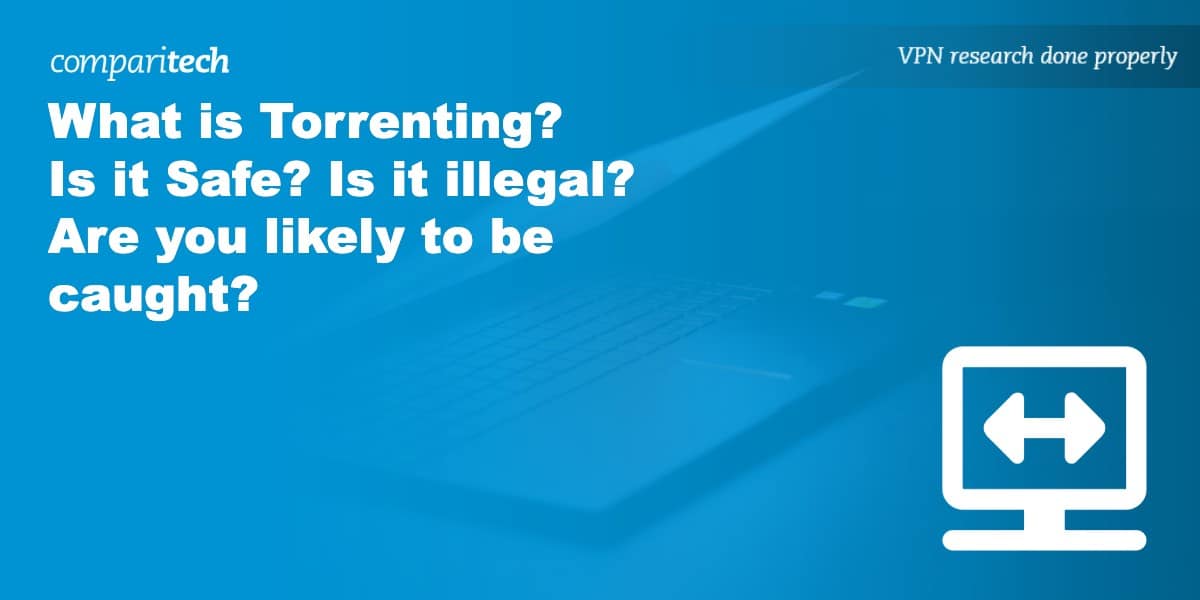
Iii questions I'm oft asked are: Is torrenting safe, is torrenting legal, and what happens if I get caught? This post answers those questions and looks at the methods torrenters use to stay safe and anonymous.
What is Torrenting?
Torrenting is the act of downloading and uploading files through the BitTorrent network. Instead of downloading files to a central server, torrenting involves downloading files from other users' devices on the network. Conversely, users upload files from their ain devices for other users to download.
Torrenting is the almost pop form of peer-to-peer (P2P) file-sharing, and it requires torrent management software to connect to the BitTorrent network. Such software can exist downloaded for costless for a number of different devices.
Everyone downloading or uploading the same file is called a peer, and collectively they are known as a swarm. Because of how BitTorrent works, a peer can download a file from several other users at in one case, or upload a file to multiple other users simultaneously.
Torrenting is ofttimes associated with piracy because it'south often used to share files that are protected past copyright, including movies, games, music, and software. Withal, torrenting has many legitimate uses as well, such every bit lessening the load on centralized servers by distributing the hosting brunt amidst users.
Torrenting safety and legality: In short
Is torrenting legal or illegal? Torrenting itself isn't illegal, but downloading unsanctioned copyrighted material is. It's non ever immediately credible which content is legal to torrent and which isn't. Some fall in a grayness area, and so you lot may detect yourself unwittingly on the wrong side of the law.
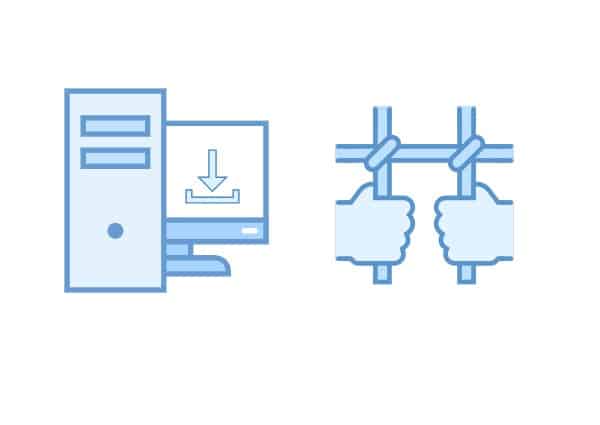 Your isp (Internet service provider) and copyright trolls monitoring the BitTorrent network can take activeness if they catch you illegally torrenting. This can range from a alarm alphabetic character and throttling (slowing downward) of your cyberspace connection speeds to legal action – although the latter is increasingly rare.
Your isp (Internet service provider) and copyright trolls monitoring the BitTorrent network can take activeness if they catch you illegally torrenting. This can range from a alarm alphabetic character and throttling (slowing downward) of your cyberspace connection speeds to legal action – although the latter is increasingly rare.
Digital privacy-witting torrenters will use VPN services, or virtual private networks, to keep their internet activeness hidden from their ISP. With a wide range of applications, some VPNs are better suited for torrenting than others. If you want to go along your Internet access provider from snooping on your activity, choose a VPN connection that: a) doesn't continue a log of your activeness, b) isn't based in a state where the legal arrangement tin can be used to need client records, and c) is fast enough that information technology won't slow unabridged downloads. We've rounded up the providers that fit these criteria and others in our listing of the best torrenting VPN services.
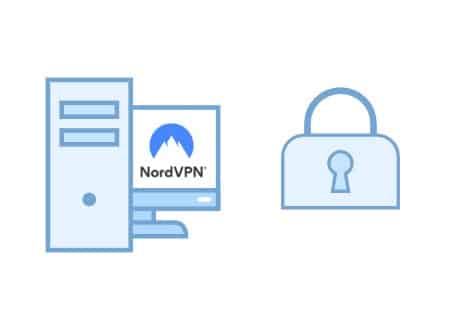
How to torrent safely
It is relatively unproblematic to torrent safely and keep your online action private. Notation that while a VPN for torrenting will keep your activity private and safety from prying eyes you may still be susceptible to malware from some public torrent sites. Follow these 5 steps to torrent privately with a VPN.
Hither'south how to torrent safely:
- Download and install a VPN matching the criteria mentioned above. We recommend NordVPN.
- Enable your VPN's kill switch, if information technology has ane.
- Connect to a VPN server, preferably in a P2P-friendly country
- Once the connection is established, open up your torrent client and start downloading equally usual
- Your online activity is now encrypted by your VPN
WANT TO Attempt THE Tiptop VPN Take chances Free?
NordVPN is offering a fully-featured risk-free 30-day trial if you sign up at this folio . You can utilise our #1 VPN for torrenting with no restrictions for a total month — great if you want to try its P2P-optimized servers first-hand.
In that location are no hidden terms — just contact support within thirty days if y'all determine NordVPN isn't correct for y'all and yous'll receive a full refund. Start your NordVPN trial here .
Torrenting without a VPN
Torrenting without a VPN ways your cyberspace service provider (Internet access provider) tin encounter your online action including the sites you visit and the content you lot view. In certain countries, including the United states of america, ISPs are allowed to share this information with third parties including intellectual belongings owners. A VPN will proceed your online activity private from your ISP.
Is uTorrent prophylactic?
uTorrent is the official torrent client from the creators of the BitTorrent protocol. Information technology is proprietary—not open source—software maintained by a legal Usa visitor. Similar BitTorrent, the uTorrent software itself is legal, although it can be used for digital piracy. The official uTorrent is free of malware and tin can be used safely and privately in combination with a VPN. It does not, however, prevent users from downloading malicious files that tin infect their device.
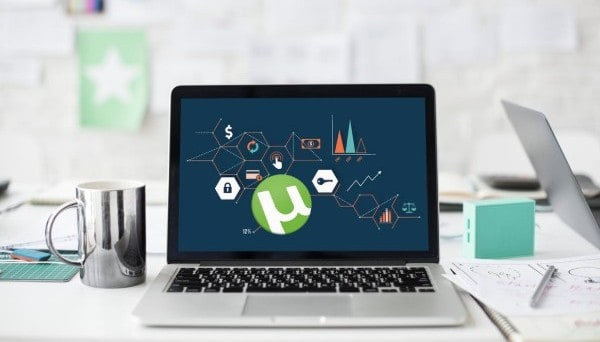
In detail
The BitTorrent protocol rose to become the most popular medium for peer-to-peer file sharing in the world after the demise of centralized services like Napster and Limewire. Unlike those services, torrenting is nearly completely decentralized relieve for the trackers that allow users to search and download torrent files and magnet links. Torrent files and magnet links are used to find other users on the network who host the desired file or files just exercise not actually host those files for downloading.
Is BitTorrent safe and legal?
The BitTorrent protocol is non in itself illegal or unsafe. It is only the means to share any blazon of file, and plenty of legal torrenting services practise be. The most popular torrent trackers, such as ThePirateBay and KickassTorrents, however, operate in a legal grayness surface area, offering users free access to copyrighted content. Sharing and downloading copyrighted content by BitTorrent, or other means, is illegal in many countries and can exist dangerous since sites including KickassTorrents have been shown to host malware.
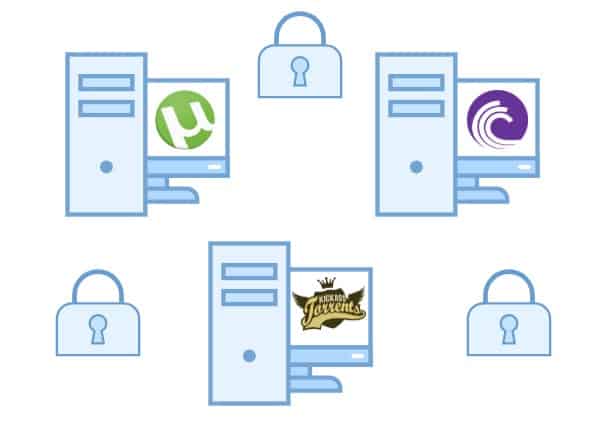
These trackers would argue that they but observe and organize information that is already out there, and they do not illegally host whatsoever copyrighted content on their own servers. Just similar the BitTorrent protocol itself, they are the means to an finish. Not everyone is convinced. Major trackers accept come up under heavy legal scrutiny from content creators and distributors who fence the trackers enable and encourage theft.
The blame ultimately shifts to the users, the millions of individuals who host files on their personal computers, downloading and uploading movies, games, software, music, ebooks, and more. Users connected to the same tracker are chosen peers, and they fall into two categories. A leech uses a torrent file or magnet link to download the file from other users on the network who already have the file. These users who already take the file are called seeds. When a leech is finished downloading a file (or even just part of a file), he or she becomes a seed, assuasive other leeches to download the file from his or her reckoner. As a general rule, information technology's considered proper pirate etiquette to seed as much every bit you leech.
Comparitech does not condone or encourage any violation of copyright law or restrictions. Delight consider the police, victims, and risks of copyright piracy before downloading copyrighted material without permission.
Legally speaking, seeding and leeching copyrighted material fall into different criminal categories. Think of information technology similar buying illegal drugs: purchasing the drugs for personal apply is definitely a crime, but a relatively pocket-sized one. Turning around and selling those drugs to others is a much more than serious offense. Finding the original source of the drugs, or in this case the HD rip of the new Avengers movie, would be the best case scenario for law enforcement, but that isn't e'er possible. The trackers act as the shady back aisle marketplaces where all of these transactions go downward, only they don't personally handle whatsoever of the drugs.
What happens if you are defenseless torrenting?
The prosecution of torrent users has been desultory. The chances of actually going to court or having to pay a settlement are pretty slim, but the penalties tin can be extremely high. The frequency of copyright holders suing torrenters for copyright infringement peaked in the tardily 2000s. Copyright pirates were sued for wildly disproportionate amounts of money, and most settled out of court.
These public scare tactics shone poorly on the recording and movie industries because they were portrayed every bit footling millionaires bullying poor higher students. Directly lawsuits are much less common these days, but the entrada confronting torrenters is far from over.
Copyright trolls
Now the chore of going after private copyright pirates has been outsourced to a growing number of small businesses known as copyright trolls. These companies locate torrenters who illegally download copyrighted content through their real IP addresses. They and then approach the copyright owners and sign a deal that lets them take legal action on their behalf. Others are hired direct by Hollywood product companies to sniff out pirates.
With legal leverage and a list of names, the copyright trolls and so go after torrenters via mail, e-mail, or even by going door to door and handing out settlement letters. These messages are non legally binding documents or injunctions. Copyright trolls use intimidation, fear, and shame to make torrenters pay without e'er going to court. A common tactic is to threaten to sue for over $100,000 but merely ask for $3,000 or and then in the settlement. That makes the $iii,000 look similar a skilful deal, but going to court is costly and risky for them, so don't give in if yous receive such a letter.
What to do if y'all receive a settlement letter
The most common way to receive a settlement letter is through your internet provider. A copyright troll will go through the court arrangement to subpoena your Internet access provider and force it to email customers with a legal threat and hand over personal details.
Co-ordinate to US law, an IP address is not a person. If you were contacted through your Internet service provider, chances are that's because the copyright troll doesn't know your actual identity yet. If the letter doesn't contain any identifying information on you lot, keep it that way and do nothing. Your case could exist dismissed before the date that your Isp is set to reveal your personal details to the troll. If yous respond and place yourself, that gives the troll a more direct ways of targeting you lot.
This is a game of probability for copyright trolls. If they transport out 1,000 threatening emails and l people respond, they only demand a handful to actually cough up money to make information technology worth their time. Chances are it's more than cost effective for them to movement on to the side by side swarm of torrenters than pursue the remaining 950 people.
If things escalate and you determine to take activity, lawyer up. Here'due south a list of attorneys compiled by the Electronic Borderland Foundation that specialize in these sorts of cases.
Internet service provider penalties
Depending on your Internet service provider, it may take actions against you on its own behalf. That could mean throttling your internet connectedness or threatening to manus over personal details to a copyright troll. Why does your ISP even care? Because torrenting takes upwardly a lot of bandwidth, and that bandwidth costs ISPs money. On peak of that, an ISP could be receiving kickbacks from content owners and their associates.
How to protect yourself
To avert any legal ramifications, it'due south all-time to simply not torrent. However, if you lot insist on torrenting, accept the time to protect your online privacy and keep copyright trolls at bay.
Utilize a VPN when torrenting
The best fashion to torrent safely is by using a VPN. A VPN accomplishes two things: starting time, it re-routes all your internet traffic through a server in a location of your choosing, which changes your existent IP accost to one used by hundreds or thousands of other people (assuming your VPN uses shared IP addresses, which nigh practise). This adds a meaning layer of anonymity and makes it much more difficult for anyone to rail you. Second, a VPN encrypts all your torrent traffic before it leaves your computer. That means your Isp cannot monitor your internet activity, nor can anyone else. And because all your traffic heads to the VPN server first, ISPs tin can't even tell where information technology'southward going.
Using a quality VPN is fundamental; don't settle for a "free" service or VPNs that log your activity, cap your bandwidth and data, or don't provide sufficient DNS leak protection. Not all VPNs tolerate torrenting. You can bank check out our list of the best VPNs for torrenting here, which are services with fast download speeds and a focus on online privacy, security and anonymity like NordVPN, Surfshark, and ExpressVPN amidst others.
Other alternatives
If you don't want to pay for a VPN, you might be considering Tor. Tor is similar to a VPN in that it routes your traffic through several volunteer "nodes" while encrypting traffic. We recommend a VPN over Tor for a couple reasons. First, Tor is wearisome, and commonly best for elementary browsing and other low-bandwidth activeness. 2nd, connecting to Tor could actually describe more attending from your Internet access provider and law enforcement, as information technology's a well-known tool for hackers and criminals.
Some other pop app amongst torrenters is Peerblock. Peerblock is a desktop firewall with a regularly updated blacklist of IP addresses. These IP addresses belong to entities that try to track your action online, particularly on peer-to-peer networks. Unfortunately, the blacklist is but updated one time upon installation. After that, users must pay to keep them updated. Even if you're willing to pay, it'southward unlikely that the blacklist could contain every possible IP address for copyright trolls, universities, and constabulary enforcement. A copyright troll merely needs to connect to the swarm–all the devices continued to a single torrent–with an IP that isn't on that blacklist to become your IP accost.
Usenet
Instead of torrenting, some other alternative is Usenet. Usenet is a paid service-usually between $10 and $20 per month–where you download files from centralized servers instead of a network of peers. Usenet downloads are much, much faster; often as fast equally your ISP can handle. Usenet is more individual every bit well. The connections take place betwixt yous and the provider's network of servers, and the all-time providers offer an SSL-encrypted connection. Some fifty-fifty throw in VPNs for good measure out. Torrents, on the other hand, crave that you share at least some identifying information to connect to the tracker and peers.
Finally, downloading a Usenet file doesn't mean y'all have to seed it for other internet users subsequently. Legally, this makes yous less of a target because yous're not supplying strangers with copyrighted content, at the same time consuming fewer computer resource and internet bandwidth.
Usenet providers make files available for a certain number of days. How many depends on the provider, simply the standard is i,200 days after the original posting. Until that time is upwardly, users have full access to that file. Torrents simply stay up every bit long equally people seed the file.
We've rounded up some of the best Usenet providers hither.
Public vs private trackers
A "tracker" is like a search engine that indexes files on the BitTorrent network. Trackers tin be individual or public, and the one-time ordinarily requires an invitation from an existing member.
ThePirateBay, KickassTorrents, and Demonoid are all examples of public trackers. Anyone tin simply go to their respective websites and search without logging in or requiring whatsoever sort of hallmark. Besides, anyone tin upload files for others to download. These uploads are not moderated, so users must estimate whether a download is safe and accurate based on comments and the reputation of the uploader.
Private trackers are more than exclusive both in terms of who tin upload and who tin download within a grouping. They vary wildly in terms of content and quality, but many members of private trackers attest that they have college quality files, faster downloads, longer retention, and an overall more than consistent and safe experience.
The police views individual trackers the aforementioned as public trackers. Internet piracy is piracy whether you do it in public or within a private group.
Streaming vs torrenting
Many people take moved abroad from downloading entire files through BitTorrent and opt instead to stream video content either on their web browsers or through customized programs like Kodi. When it comes to safety and the law, what's the difference?
Legally speaking, you're probably nonetheless breaking the law when y'all stream illegal content from a pirated source. However, this depends largely on your country. In the UK, information technology'south outright illegal. In India, a court ruled that it is absolutely non illegal. In the US, information technology's still a grey expanse, every bit there'south been no precedent of anyone being bedevilled for copyright piracy after streaming copyrighted video content from an unsanctioned source.
Those who upload the videos without compensating or asking permission from the copyright holder practise and so illegally. That's pretty much standard no matter where you are.
Not only practise laws tend to be more than lenient toward streaming content, simply it's also more than difficult for copyright trolls and constabulary enforcement to catch users in the human action. When you lot download a torrent, y'all tin can encounter the IP addresses of everyone else you're uploading to or downloading from. Just streaming transmits a video direct from a website to your device, with no third parties involved.
Don't get as well comfortable, however, as there are nevertheless risks. The website could exist logging IP addresses or other information almost its users, which it could and so manus over to law enforcement or a copyright troll. Your Internet service provider could monitor your action and see that you are watching pirated content. These are risks that can be mitigated by connecting to a reputable VPN.
When it comes to security, streaming video carries just as many risks as torrenting. Websites that stream pirated content tend to be chock full of intrusive ads, malware, and phishing threats. Kodi users are subject to homo-in-the-middle (MITM) attacks and other threats from the add together-ons they download.
More than tips
Equally a rule of pollex, avoid downloading movies that were released on DVD and Blu-Ray in the past 60 days, specially big-hit blockbusters. That's when movies make the vast majority of their post-box office money, after which their income significantly drops off. Copyright holders will put most of their anti-piracy resource into going subsequently torrenters of new releases to minimize the financial harm. The same goes for Television series, shows and video games.
Users of Popcorn Time, the complimentary flick-streaming app, should tread just every bit carefully as torrenters. Many Popcorn Fourth dimension users don't realize that the app really streams directly from torrents and will even seed a file and then it is uploaded to other users. All the risks associated with Popcorn Time apply in equal measure to torrenting.
Choose your torrents wisely. The most popular torrents on ThePirateBay and KickassTorrents are probably the ones existence about closely monitored by copyright trolls. However, don't option totally unpopular ones either. Read through the comments section, where users often run virus scans on torrent downloads and post the results. They will also give you a full general review of the quality.
Even if the comments are positive, run your ain virus scans every bit well. Ideally, use multiple antivirus programs to run an array of scans, every bit each of their virus libraries can differ. Non all antivirus programs play nice with each other, yet, so mixing two or more must be done with care. Nosotros recommend Bitdefender to browse all downloads before opening. This is particularly important when downloading games and software, which are frequently "croaky" by the uploader. Cracks make it easier to bypass DRM schemes that validate content with the publisher, simply they also make it easier to distribute hidden malware, spyware, and viruses. Check out Comparitech'southward antivirus reviews section hither.
Torrenting FAQ
Why did BitTorrent install adware on my computer?
BitTorrent is a network and protocol used to share files, so BitTorrent itself cannot install adware on your computer.
Even so, the programs used to connect to the BitTorrent network and download files, called torrent managers or torrent clients, can and often exercise come with adware. The files y'all download can likewise contain malware and adware.
Stick to reputable torrent managers and, if prompted, refuse any offers to install additional software aslope them. These additional programs are frequently adware.
Likewise, be certain to only download and upload torrents you trust.
Is downloading a shared torrent from Google bulldoze illegal?
If you're downloading something from Google Drive, then it'southward not a torrent. It'due south just a download. The file might have originally been downloaded through BitTorrent, and then uploaded to Google Drive where others can download it.
Semantics bated, if the content of the file is protected past copyright, then yep, information technology is illegal to download pirated files from Google Drive.
Can I only download a torrent from a public place?
Well-nigh torrenters use public trackers to notice and download files through BitTorrent. And so in that sense, yeah, you lot can download a torrent from a public place provided you have a torrent client installed on your device.
The files themselves are downloaded from other BitTorrent users who accept downloaded the file and are at present uploading it to swain users.
Private trackers are also available and are often safer, but typically require an invitation from an existing member.
Can I go to jail for torrenting?
It depends on the circumstances, but no, it'due south highly hundred-to-one you would become to jail for torrenting. Nearly lawsuits regarding torrenting are civil suits, non criminal ones, so if a penalty is levied, it'due south usually a fine or some other monetary bounty.
That being said, it also depends on what state you're in, what you torrent, and whether you besides seeded the file then information technology could be downloaded past other users. Check your local laws and regulations.
What are the risks of torrenting music?
The music recording industry has, on occasion, aggressively targeted torrenters who engaged in music piracy. These days, litigation is more often than not washed by copyright trolls who target torrenters on behalf of recording studios. They'll send out settlement letters demanding hundreds or fifty-fifty thousands of dollars to torrenters whom they can identify. They usually go through net service providers to contact torrenters. Your ISP could throw you under the motorbus, and that'due south not a chance we recommend taking. Past using a VPN, yous can greatly reduce the risk of being identified by a copyright troll.
What legal use cases tin can I use torrents for?
There are plenty of free ways to employ BitTorrent. Here are a few examples:
- Open-source software, such equally Linux distros, are oftentimes available for download via BitTorrent. This saves the organization maintaining the distro from having to host the files themselves.
- Public domain media, similar old movies, books, and music for which the copyrights have expired, tin can be plant and legally downloaded through BitTorrent
- Independent artists making movies, games, books, and music often mail service their content for gratis on BitTorrent.
- BitTorrent is a convenient way to access fair use materials from various media
Where do people get torrents from?
Torrents are commonly establish on BitTorrent trackers , which are essentially searchable websites that index torrents uploaded past users. Users tin download the pocket-sized torrent file, which your torrent client uses to discover other users uploading and downloading the same content.
Trackers can be public or individual. Some torrents are linked to directly.
What are Seeders and Leechers?
A seed is a user who uploads files to the BitTorrent network for other users to download.
A leech is a user who downloads files from the BitTorrent network from other users.
A typical user starts equally a leech by downloading a file. In one case the file is finished downloading (or fifty-fifty earlier), the user transitions to being a seed and starts uploading the file to other users.
A common courtesy amidst torrenters is to seed as much data as y'all leech. So if you download a 1 GB file, yous should seed that file until you've uploaded at to the lowest degree an equivalent corporeality of data. However, this guideline is in no fashion enforced.
Source: https://www.comparitech.com/blog/vpn-privacy/is-torrenting-safe-illegal-will-you-be-caught/
Post a Comment for "Does Uploading at Maximum Speed Make It Harder to Download Torrents"